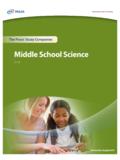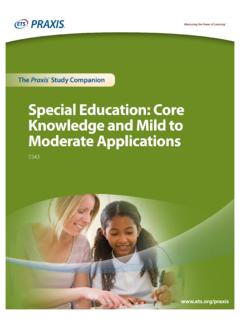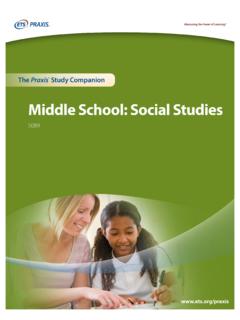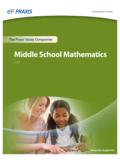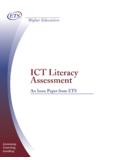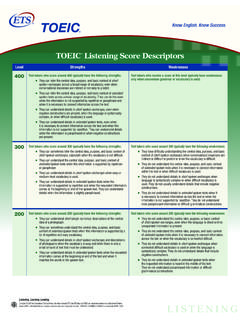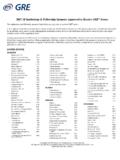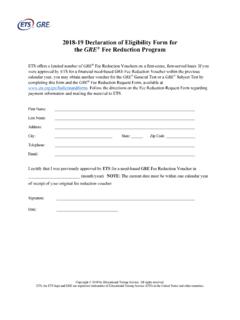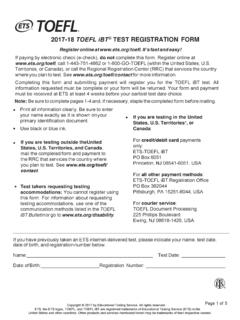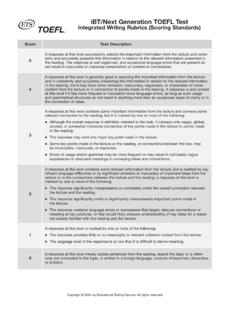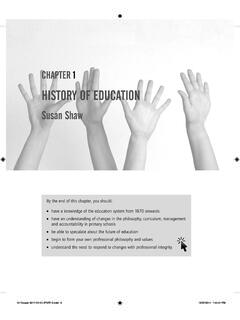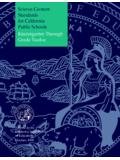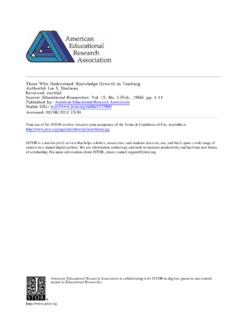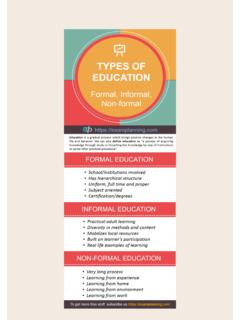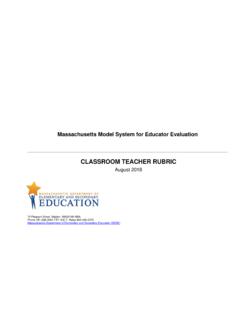Transcription of Content Knowledge for Teaching - ETS Home
1 Content Knowledge for Teaching : Innovations for the Next Generation of Teaching Assessments Capitalizing on its rich tradition and leadership in education research, ETS research scientists and assessment experts have been working with colleagues from the University of Michigan to develop, research, and refine assessments focused on the Knowledge that teachers need to effectively engage in critical tasks of Teaching , what we refer to as Content Knowledge for Teaching (CKT). One focus of the ongoing research is the potential for use of assessments of CKT to improve the measurement of Content Knowledge in the Praxis II test series. CKT Theoretical Orientation CKT is a practice-based theory that describes the Content Knowledge involved in the Teaching of a subject. The theory is constructed from a form of job analysis, where Content -based tasks are identified through an analysis of teachers' work to identify particular examples of recurrent Content -based tasks of Teaching .
2 CKT. is then inferred through an analysis of the Content demands that teachers encounter in carrying out these tasks. The critical point to remember is that Content Knowledge is only considered CKT when a logical justification can be made for a direct application to Teaching practice. What is CKT as it relates to assessment? Measures of CKT are designed to approximate how Content Knowledge is used in Teaching practice, bearing in mind that Teaching occurs in many settings. Most obviously, Teaching occurs in direct face-to-face interactions with students. But Teaching also involves analyzing student work, making choices about Content -based activities for instruction, choosing appropriate questions to ask in instruction, explaining student progress to a colleague or parent and in many other Content intensive practices that support the interactive work of Teaching . i Therefore, assessments that include CKT questions go beyond the types of Content and pedagogical Knowledge currently tested on traditional licensure assessments.
3 CKT assessments are very tightly connected to Teaching practice and are therefore specific to a particular subject area and grade range. To date, CKT questions have been developed around written descriptions of authentic Teaching situations. ETS. is currently considering whether and how additional items that make use of other formats ( , video). might also be included in CKT instruments. Research History For more than 25 years, researchers have been exploring the idea that there is Content Knowledge unique to Teaching a kind of subject matter specific professional Knowledge . ii Lee Shulman and his colleagues first proposed the idea in the 1980s, using the term pedagogical Content Knowledge to refer to this new domain of teacher Through their work, Shulman and his associates sought to represent Content understanding as a special kind of technical Knowledge key to the profession of Teaching .
4 Iv One of seven categories of teacher Knowledge (see Figure 1), Shulman defined pedagogical Content Knowledge (PCK) as that special amalgam of Content and pedagogy that is uniquely the province of teachers, their own special form of professional understanding. v Figure 1: Shulman's Major Categories of Teacher Knowledge General pedagogical Knowledge , with special reference to those broad principles and strategies of classroom management and organization that appear to transcend subject matter Knowledge of learners and their characteristics Knowledge of educational contexts, ranging from workings of the group or classroom, the governance and financing of school districts, to the character of communities and cultures Knowledge of educational ends, purposes, and values, and their philosophical and historical grounds Content Knowledge Curriculum Knowledge , with particular grasp of the materials and programs that serve as tools of the trade for teachers Pedagogical Content Knowledge , that special amalgam of Content and pedagogy that is uniquely the province of teachers, their own special form of professional understanding (Shulman, 1987, p.)
5 8; quoted in Ball et al, 2008, p. 391). Implicit in Shulman and his associates' work was the argument that high-quality instruction requires a sophisticated, professional Knowledge [PCK] that goes beyond simple rules such as how long to wait for students to respond. vi Shulman wrote: The most useful forms of representation of those ideas, the most powerful analogies, illustrations, examples, explanations, and demonstrations in a word, the most useful ways of representing and formulating the subject that makes it comprehensible to others .. Pedagogical Content Knowledge also includes an understanding of what makes the learning of specific topics easy or difficult: the conceptions and preconceptions that students of different ages and backgrounds bring with them to the learning of those most frequently taught topics and lessons. vii For well over a decade, Deborah Ball and her colleagues have undertaken extensive research with mathematics teachers, studying how they carry out the work of Teaching mathematics.
6 Their work has deepened our understanding of Shulman's concept of PCK in the field of mathematics instruction. As Ball and her colleagues wrote in 2008: By mathematical Knowledge for Teaching , we mean the mathematical Knowledge needed to carry out the work of Teaching mathematics. Important to note here is that our definition begins with Teaching , not teachers. It is concerned with the tasks involved in Teaching and the mathematical demands of these tasks. Because Teaching involves showing students how to solve problems, answering students' questions, and checking students' work, it demands an understanding of the Content of the school curriculum. Beyond these obvious tasks, we seek to identify other aspects of the work and to analyze what these reveal about the Content demands of Teaching . viii Two questions have guided their work: 1. What are the recurrent tasks and problems of Teaching mathematics?
7 What do teachers do as they teach mathematics? 2. What mathematical Knowledge , skills, and sensibilities are required to manage these tasks? Summarizing their extensive work, Ball and her associates wrote: Although these analyses are ongoing, we see persuasive evidence that the mathematical Knowledge needed for Teaching is multidimensional. That is, general mathematical ability does not fully account for the Knowledge and skills entailed in Teaching mathematics (Hill et al., 2004). Like Shulman, we think it important to identify, isolate, and measure the Knowledge and skill distinctive of Teaching and essential to establishing its status as a professional activity even though we recognize that in actual Teaching such boundaries can seem artificial . ix Researchers at the University of Michigan have been undertaking similar studies in the field of reading and have designed and tested CKT items at the elementary level.
8 They are also finding evidence that there is specialized Knowledge for Teaching reading at the elementary level across two broad topic areas: comprehension and word analysis. x Researchers have also begun to establish criteria for CKT items for physical science and social studies. xi And, for the last two years, ETS and University of Michigan researchers have been developing and testing CKT. measures for mathematics teachers in later grades and also for teachers of English Language Arts as a part of the Measures of Effective Teaching (MET) project funded by the Bill and Melinda Gates Foundation. xii ETS is providing additional support in 2011 to expand the research and development of CKT assessments. Defining Characteristics of CKT Assessments CKT-based assessments have a number of distinctive characteristics. Because the items provide sufficient context to make both the task of Teaching and its instructional purpose clear, the test taker can see the direct link of the item to their own practice.
9 Because the items are situated in Teaching , it is immediately apparent how the Knowledge that is measured matters for Teaching . Because the items require participants to engage in thinking about and working through tasks of Teaching , they have very high levels of face validity. Because Teaching involves ways of working with Content that are often different from how most adults commonly use Content , the CKT items are ideally suited for measuring Content Knowledge that is specialized to Teaching . Because CKT is linked to particular practices and topics, CKT items are designed to be used at a targeted grade span. Because CKT items forge a link between Knowledge and practice, performance on the measures has been related to effective Teaching . xiii Summary Built on 25 years of research, CKT is emerging as a powerful tool for measuring the Content Knowledge used in Teaching . In order to better understand how use of CKT questions might improve measurement of Content Knowledge in initial licensure tests, planning is underway to pilot CKT questions in an optional section of some Praxis II tests beginning in 2012.
10 Additionally, more than a dozen states are collaborating with ETS in a three-year research and development project to design, develop, pilot and field test CKT. measures that could someday augment state specific professional licensure systems. This collaborative work will undoubtedly increase our mutual understanding of how to measure Teaching practice in more authentic ways and is expected to ultimately result in the strengthening of teacher effectiveness in the classroom. Appendix: Examples of CKT Items Examples of CKT items include the understanding teachers must possess of the common patterns of student thinking about specific concepts, the best ways to represent particular concepts, how to interpret student work production related to the concept under study, and how to identify and teach to mitigate the misconceptions students have about specific concepts within the subject matter under study.
